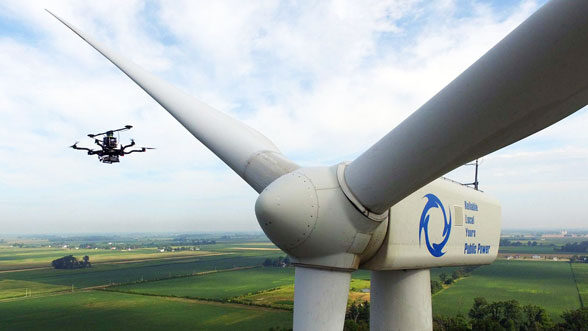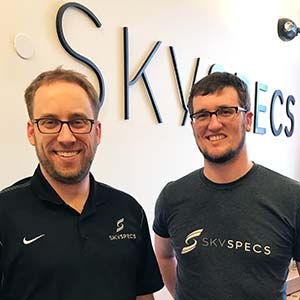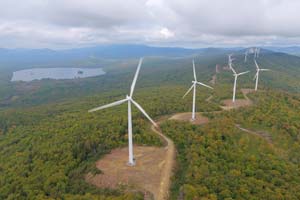Head in the clouds
It was summer 2008 and Danny Ellis, MSE ’13/BSE ’10, and Tom Brady, MSE ’13/BSE ’11, were student interns at a hydraulics lab in Kalamazoo, Mich. Inside their test cell at the aerospace firm, they aspired to a future that would be more stimulating than watching numbers on a computer screen. Eyeing an emergency cutoff switch — in case of, well, an emergency — was not the life plan.
“We were kind of joking about what we were doing as aerospace engineers,” Ellis says. “We thought of all these crazy ideas that would be a lot more fun than what we were doing there. Granted, we got paid very well for interns that had never held real jobs before, but we were like, ‘Man, we should really start our own thing.’ But it was like a total joke.”
Not anymore. Ellis and Brady are CEO and CTO, respectively, of Ann Arbor-based SkySpecs, an autonomous drone startup revolutionizing wind farm inspection.
Founded in 2012, SkySpecs doesn’t actually produce drones. Its core competency is the sensors-and-software game, programming the aerial vehicles to “see” obstacles, avoid collisions, and record data. This way, owners and operators of wind farms can focus on maximum energy output while reducing maintenance costs. Owners can be predictive and proactive, mitigating problems before they arise. Inspections take about 20 minutes and the software triggers the drone’s camera at exact locations to capture the required information. Drones can fly within two meters of the turbine blade, all while avoiding a crash.
Eye in the sky
Signs pointing to SkySpecs came early to Ellis. As he contemplated his senior design, he wanted to make something that flew.
He told Brady at a campus bonfire the next year: “‘We should build a drone,’ only we didn’t call it a drone. We called it ‘an unmanned aerial vehicle’ because that’s what they were called back then.”
It was a cool idea, except they didn’t know how to pay for it.
“The only way we could get funding for a senior design was if it was a student competition team and we got corporations to fund it,” Ellis says.” I went online and found this competition for these autonomous drones and decided to enter it. We got Northrup Grumman to sponsor our team.”
They called themselves Michigan Autonomous Aerial Vehicles (MAAV).
“Not once in those early days were we designing it to make a business,” Ellis says. “At most it was to build experience so we could go interview well at a company, but it was never to be a long-term project.”
And yet, building a more capable “quad-rotor aerial vehicle” became such a passion that the two stayed at U-M’s College of Engineering (COE) for grad school. They taught classes, including Introduction to Aerospace Engineering, and made enough money to “let us continue goofing around on the student project,” Brady says.
Think and do
Ellis got a creative boost teaching that freshman-level intro class, where teams spend the semester building and racing indoor drones. It had been one of his favorites when he was just a freshman.
“It was the very first class I ever stepped into,” he says. “I thought, ‘This is what college is going to be like.’”
Pete Washabaugh, associate professor of aerospace engineering, and Leslie Olsen, professor of technical communication, sought to bring students like Ellis back to earth. Not all of their classes would be this dynamic, they cautioned. There was plenty of theory and a whole lot of reading in their engineering coursework.
But the instructors didn’t want to tamp down the students’ enthusiasm too much. So Washabaugh, who was director of the COE’s Wilson Student Team Project Center, helped the MAAV team find work space. Olsen shared her fundraising connections for the drone competition.
“I would always give a new student project team a desk at the Wilson Center, which is all they usually wanted,” Washabaugh says. “Danny and Tom were different. The next day they took over half the other desks in the vicinity. At the end of the week, I was trying to contain them.
“You get these students or groups of students every five years or so,” he continues. “They don’t always start their own company, but they do leave a legacy.”
Today the MAAV team Ellis and Brady created is thriving with 40-50 members. Northrup Grumman and Lockheed Martin are team sponsors.
Flying high
In their second year of grad school, the University’s Center for Entrepreneurship paid for Ellis, Brady, and a few others to travel to San Francisco during spring break to pitch MAAV as a startup to alumni in the Bay Area’s venture capital community.
Brady recalls their somewhat “exaggerated” presentation. “We pitched this drone that could do anything. We had it all figured out. I’m sure our projection then would have had us be billionaires by now.”
The alumni recognized the presentation was mostly fiction, but they loved the technology and the presenters’ enthusiasm. Back in Ann Arbor, Ellis and Brady decided to make it official. Back in Ann Arbor, Ellis, Brady and their third co-founder, Sam DeBruin, decided to make it official.
“We were kind of hiding out in grad school,” Ellis says. “It’s not like we weren’t going to be able to get jobs later. If we failed in eight months, people wouldn’t know we ever started it.’’
In an auspicious twist of fate, Ellis met his wife, Kelley, on a blind date the same day he, Brady, and DeBruin mailed the paperwork to create the company. (DeBruin later went part-time.)
Green takers
While the SkySpecs drone was still a pre-prototype, Ellis hit the road pitching investors. He covered 75,000 miles in a year only to end up back in Michigan with local seed money. Then, winning the $500,000 Accelerate Michigan prize in 2014 helped meet payroll while the SkySpecs team attended a four-month Tech Stars accelerator program in New York. The Series A round funding in 2015 was led by Venture Investors and Huron River Ventures in Ann Arbor. Investors from Chicago and Germany led last November’s Series B round.
As SkySpecs grows beyond its 22 employees and triples its work space to 4,700 square feet at Liberty and Ashley streets, the crew is focused on adding customers. Contracts have been coming in since the commercial launch in April 2017.
Ellis can imagine a time when satellite offices will be required to meet future needs. But SkySpecs will always call Ann Arbor home, where the founders frequently are asked for advice and mentorship.
“One of the most impressive things I’ve seen here is the caliber of talent that we’ve been able to bring straight out of the University,” Ellis says. “In the early days, our first hires were students. And they were some of the smartest people we ever met. It’s a huge testament to the ecosystem that’s being built up here. It’s not unique to just us.”






